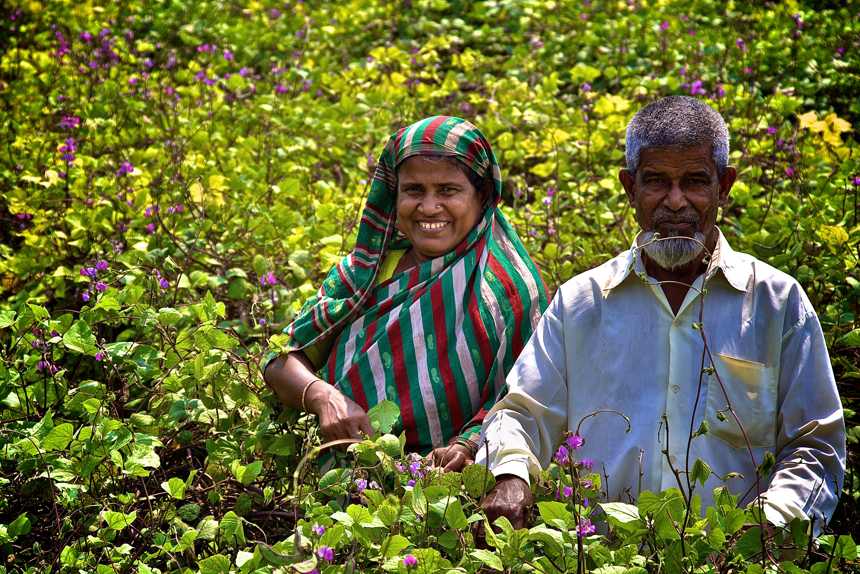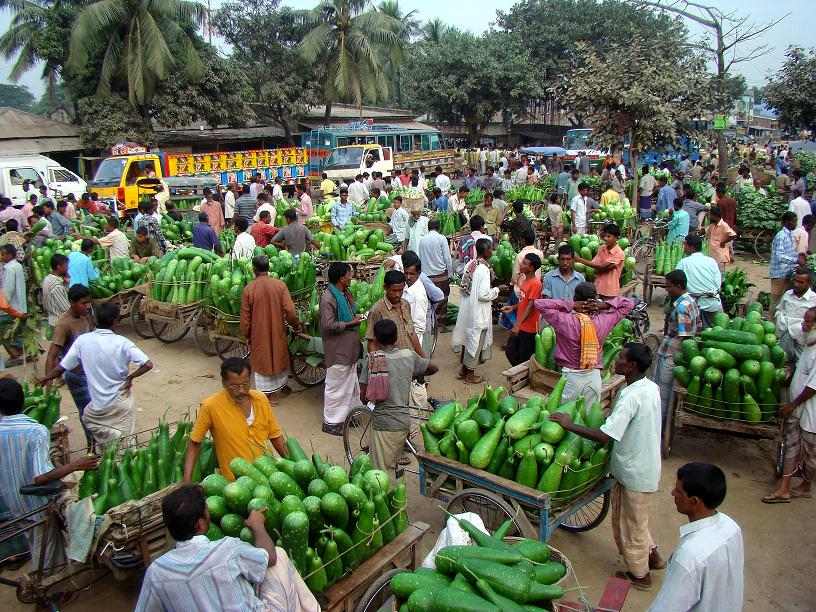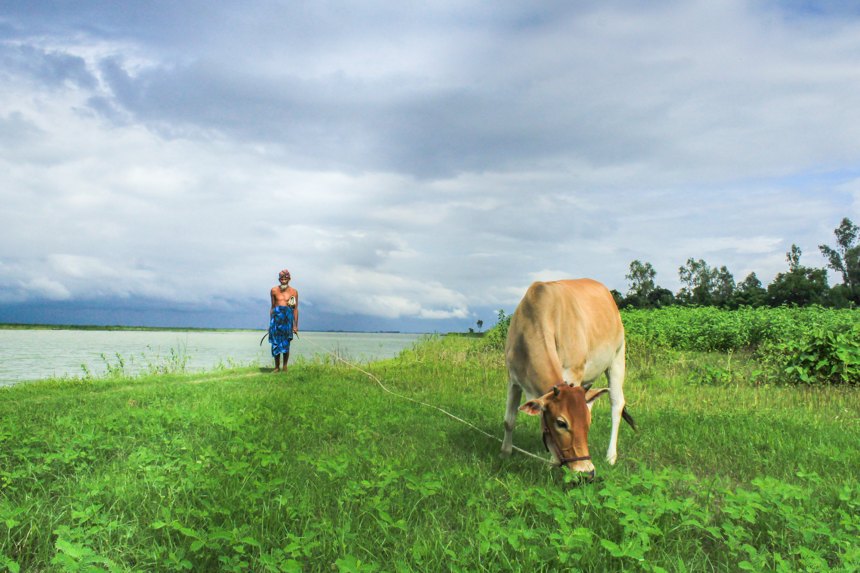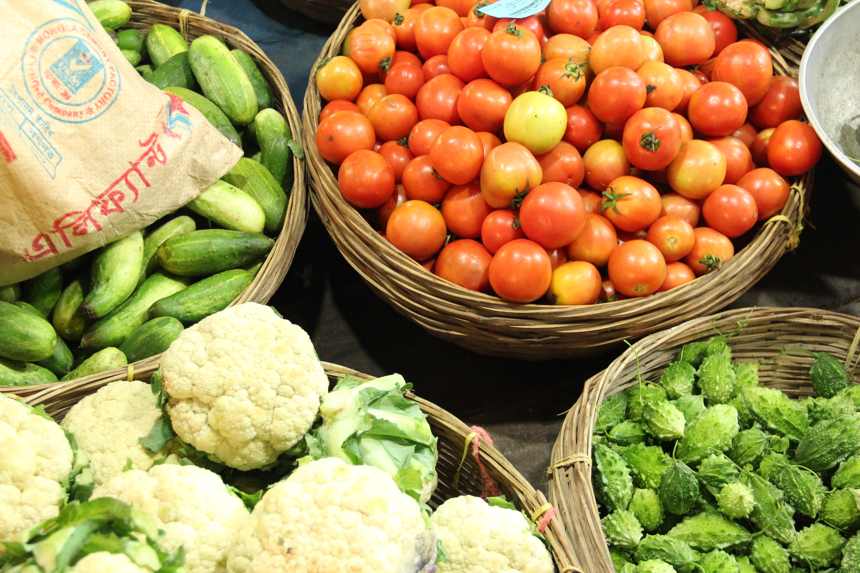
Smallholder farmers in Bangladesh and across markets face a number of challenges. Access to finance remains an uphill battle. Good quality agriculture inputs remain expensive. The agriculture supply chain, which is riddled with middlemen and inefficiencies, makes access to the market costly for farmers and thus eating into their profit margin. These inefficiencies affect all of us all in one way or the other. Farmers suffer due to wastage and a system that seldom guarantees a fair price. Businesses and consumers suffer due to compromised quality of agri-produce and unpredictable price.
Almost 70% of farmers don't have access to formal financing in Bangladesh. Instead, they take loans from local traders, loan sharks, and friends and family at a much higher interest rate. Microfinance offers an option. But microfinance was never designed for agriculture. For example, microfinance requires you to pay weekly installments but if you take a loan for buying a cow you can’t repay it in weekly installments. Farming does not work on a weekly timeline. The added burden of the relatively high-interest rate makes microfinance an infeasible option for smallholder farmers.
The quality of input is directly connected with finance. Buying quality inputs requires cash. Since the majority of smallholder farmers often struggle with cash, they can’t invest in high-quality inputs. Instead, they go for options where they can get credit and low prices. Low-quality input means the quality of products and productivity suffers. This is one of the reasons behind the low agriculture yield in Bangladesh. If you look at the yield in Bangladesh per hectare or cattle, it is quite low compared to the global or even South Asian average. Part of the blame can be attributed to low-quality inputs.
Finally, access to the market. Farmers across Bangladesh rely on middlemen for selling their goods. For any agriculture products in Bangladesh, be it fish, livestock, or vegetable, there are some 5-7 layers of middleman between farmers and consumers. The middlemen driven supply chain increases the price for businesses and consumers but farmers hardly get more than 30% of that price. An Asian Development Bank (ADB) report suggests, farmers in Bangladesh get only 27% of the selling price of red amaranth, 44% of that of pineapple, 45% of that of tomatoes, and 46 percent of that of cucumber.
These are complex interconnected challenges and demand comprehensive solutions. This is where iFarmer, a Dhaka-based agri-fin-tech company, comes in. For the past three years, iFarmer has been working relentlessly to solve these problems using a combination of technology and data.
iFarmer is a for-profit company with a strong impact mandate. Founded in 2018, the company started by addressing the challenge of finance. To date, iFarmer has worked with some 5000 farmers and has done almost $1.5 million of financing to farmers. iFarmer does not give direct cash to the farmers. Partly because the company does not want to do so and partly because it can’t due to regulatory limitations. Instead, it provides vouchers and other options that farmers can use to buy/access high-quality inputs through iFarmer designated retailers. iFarmer provides input as a service to farmers. Farmers don't need to give iFarmer anything upfront. Instead, they share profit at the end of the season, which makes it easier for the farmers to repay. iFarmer’s intervention solves both the finance and input challenges for the farmers.
iFarmer collects the investment from retail investors, who are interested in investing in agriculture farms, which then iFarmer invests in farms using a portfolio approach to ensure expected return for investors.

One approach to view iFarmer development is that the company is building an ecosystem with an ambition to maximize benefits for both farmers and retail farm investors who invest in these farmers through the iFarmer platform.
It begins with input financing. iFarmer works with retail and institutional investors and collects investment that it uses to finance farmers in the form of providing them agriculture inputs. In exchange, it gets a share of the profit from farmers which it then shares with the retail investors who originally invested in these farms through iFarmer and keeps a commission for itself.
In order to make the entire thing work, iFarmer has to ensure that the farmer makes a profit. Unless farmers make enough profit, they will not be able to repay iFarmer expected returns and iFarmer will fail to provide a return to farm investors.
The key predicament for the majority of farmers to earning a good margin is middlemen and access to the market. Farmers often have to rely on middlemen for selling their products. As a result, farmers can keep very little of what they earn. This is a challenge for iFarmer as well. Hence, iFarmer gets into creating access to the market for farmers. The company has been working with businesses to supply grocery and agriculture products in Dhaka. It coordinates between businesses and farmers to enable the market. Today, iFarmer has built a strong B2B agriculture produce supply business and aims to get into the B2C business in early 2021. Along with finance and inputs, iFarmer now helps farmers to access the market directly bypassing middlemen and thus earn a maximum profit on their products. This turns iFarmer into an ecosystem, which begins with finance and inputs and then completes with access to the market for farmers.
iFarmer sees an advantage in its connection with farmers which allows the company to aggregate supplies from farmers as well as demands from businesses for agriculture supplies. For a regular retailer or an ecommerce company, it is hard to work with hundreds of farmers. Since iFarmer already works with thousands of farmers, it can easily aggregate products from 100 farmers because it has all the data and connections.
The entire ecosystem creates a virtuous cycle of good returns for every participant. iFarmer gets a commission, which gets bigger as farmers make more profit. Farmers make more money and thus can share more profit with iFarmer which iFarmer can share with its retail investors. Similarly, it creates a layer of protection for the retail investors who invest with iFarmer by ensuring not only monitoring but also the right market price and return.
One approach to view iFarmer development is that the company is building an ecosystem with an ambition to maximize benefits for both farmers and retail farm investors who invest in these farmers through the iFarmer platform.
iFarmer currently has a team of about 25 people. Of which 8 people work in the field and the rest work out of its Dhaka office.
iFarmer is a graduate of Accelerating Asia, a Singapore based startup accelerator and investor. It has raised to date about a half-million dollars in funding from VCs and angels. iFarmer was the champion in Seedstars Bangladesh in 2019 and also was one of the winners in the Asia Pacific region. The company also got a grant from UNCDF as one of the fintech innovation winners in 2019. These recognitions from leading investors in the region and institutions like UNCDF offer validation to the iFarmer model and its effectiveness.
Regulatory permission for financing farmers
There is currently no regulation for P2P lending or crowdfunding in Bangladesh. iFarmer has submitted a concept note to the Bangladesh Bank, which the company says is under review. That being said, iFarmer does not do cash financing or provide loans to farmers. Rather it provides input support. The relationship between farmers and iFarmer follows a shared cropping model, which is a common practice in the agriculture sector in Bangladesh and does not require a separate license. iFarmer works with farmers in a profit-sharing and commission model. Farmers don’t pay interest to iFarmer.
How iFarmer works with farmers and retail investors
The process begins with farmer onboarding. iFarmer uses three approaches to onboard farmers. iFarmer has partnered with retailers in different parts of the country. These retailers have the iFarmer app and they help iFarmer onboard farmers by helping collect basic KYC from farmers. iFarmer has dedicated field agents who work directly with farmers and select eligible farmers. iFarmer has built partnerships with NGOs to onboard farmers. These are the three basic models iFarmer uses to onboard farmers. The company collects basic information such as crops and products a farmer produces and their capacity, etc during onboarding.
Once a farmer works with iFarmer, iFarmer gives them inputs or vouchers to buy input from iFarmer partner retailers. iFarmer then monitors, provides advisory support to these farmers to ensure they produce good output, and then helps them sell their products by giving them access to the market, and then finally shares the profits.
The second important component of iFarmer is working with retail investors who invest in farms through the iFarmer platform. iFarmer works with retail investors who are looking for investment opportunities outside of traditional investment options and don’t have the capacity to invest in large amounts. The company offers these investors a safe investment opportunity, excellent return in the relatively short term, and a sense of being able to contribute to farmers and agriculture in Bangladesh. The company’s model is optimized for the safety of investors with multiple layers of safety initiatives.
iFarmer works closely with farmers to collect information regarding their farming history to build profiles of individual farmers to understand their reliability. “Our ultimate objective is to build profiles of individual farmers”, says iFarmer Co-founder and CEO Fahad Ifaz. “For example, the farmers who worked with me and sold five cows, when we have more data about that farmer, next time when I work with that farmer, we can make better decisions and suggest better advice to farmers.”

How iFarmer ensures market access for farmers
Access to the market is a critical challenge for most smallholder farmers that directly affect their ability to earn the right price for their products. Since iFarmer has a direct relationship with farmers, it can access information regarding products ahead of the market and can access and coordinate products for buyers. iFarmer has precisely been doing that. The company coordinates farm products in collaboration with farmers. Grade and sort products and send them to customers.
“Coordination is the challenge”, says Mr. Fahad. “Say, for example, Khaas Food can't coordinate between 10 partners. Similarly, farmers would not be able to coordinate either. We do this coordination part. Working closely with farmers allows us to understand the total product that we can collect from farmers which we can use in building the market linkage for these farm products. We already have agreements with buyers who purchase farm produce from us. Our buyers are processing companies such as Bengal Meat, e-commerce companies such as PriyoShop, Chaldal, and superstores/Modern Trade such as Shwapno, Meena Bazar, etc. We also do wholesale such as in Karwan Bazar. We already know when buyers will need and their demands and we try to match the two. We don't have our logistics as yet. We have been working with Truck Lagbe for logistics and delivery.”
iFarmer has seen an excellent response from both farmers and markets with its access to the market program. The company sees that ensuring access to the market and access to the right price is critical for it to ensure profit for both farmers and its retail investors. It now aims to take its access to the market program to the next level with the launch of a B2C marketplace for consumers where consumers can directly buy from iFarmer.
“From January 2021, we are going to explore B2C where we will allow individuals to go to our app and order some select products and get them delivered,” says Mr. Fahad. “Many of our investors are saying that we are investing in farms, which is good, but we are also interested in buying these fresh products.”
iFarmer has seen an excellent response from both farmers and markets with its access to the market program. The company sees that ensuring access to the market and access to the right price is critical for it to ensure profit for both farmers and its retail investors. It now aims to take its access to the market program to the next level with the launch of a B2C marketplace for consumers where consumers can directly buy from iFarmer.
Lack of trust is a common challenge in Bangladesh for any company working in the space of investment. Previous bad records by bad actors where investors lost their investments continue to negatively affect the field. This is a challenge iFarmer also faces. “When we launched in 2018, a lot of people said that it is the same thing and asked whether we would run away with their money”, says Mr. Fahad. To tackle the challenge the company has taken a three-way approach: education and awareness, transparency, and security mechanisms.
“We have done a lot of work in awareness building and education over the past two years. We have focused on transparency with our investors. We provide you almost real-time information regarding your investment and farm. We put you in contact with the farmer. We facilitate farm visits for investors. We have a web and app for investors where you could see the location, pictures, farm updates bi-weekly, and monthly depending on your investment type. Our field agents monitor these farmers and collect even more information. We also collect information using remote sensing and IoT. For livestock, we use tags through which we collect information and data. For crops, we use satellite images.” This approach of radical transparency provides investors a sense of security. It also proves the sincerity of iFarmer to genuinely safeguard the money of its retail farm investors.
The second aspect is the rigorous documentation. The company has established a documentation process that ensures maximum safety for investors in case of an unwanted event. “A lot of it is about everything that is documented”, says Mr. Fahad. “When an investor is investing, we sign a stamp paper agreement, invoice, and every document that can make the transaction safer for the investor and us.”
When you are investing, there are always some risks. There are risks in banks as well but there are Bangladesh Bank and regulation for banks that ensure safety for investors. While there is no such protection when it comes to investing in iFarmer, the company has brought in mechanisms such as insurance that investors can avail of to safeguard their investments.
“While we don’t have legal protection, what we have is insurance provided by some of the most reputed insurance companies that you can buy along with your investment”, says Mr. Fahad. “We don’t sell the insurance, we simply facilitate it. Insurance comes from insurance companies. People who invest small tickets such as 20,000 taka or 30,000 taka, don't go for insurance but who invest 200,000 taka or more they do take insurance. Insurance comes from Green Delta, Progoti, and a few other insurance companies.”
To improve safety, iFarmer has started working on a blockchain initiative in collaboration with a Singapore based company. If the company succeeds, it will be the first one to try out blockchain-based financing in Bangladesh. One obvious benefit of the blockchain would be that it would ensure better traceability in the entire process such as who the farmer is, to identify their farms, and how they manage it and verify all this information. “It will make our data way more authentic,” says Mr. Fahad. “We create a distributed ledger-based data platform so that data is immutable and can not be engineered. We will be starting working on the project from January.”
The company has been able to build an excellent reputation over the past two years and has been able to attract a large number of investors who continue to stick with the company. “We have more than a thousand investors who have invested with us,” says Mr. Fahad. “The amount invested is much more interesting than the number of investors because almost everyone starts with a minimum ticket size which is around 20,00 taka and they increase gradually. Our average ticket size is almost more than 1.5 lakh taka now.”
It means the retention rate is excellent and investors continue to invest and increase their investment with time.
This approach of radical transparency provides investors a sense of security. It also proves the sincerity of iFarmer to genuinely safeguard the money of its retail farm investors.
iFarmer has taken several initiatives to ensure a good return for the investors. First, iFarmer works hard to improve the yield of farmers it works with. iFarmer works with retailers and farmers to ensure that farmers use high-quality inputs to ensure a higher yield. The company has built a monitoring, supervision, and advisory service that monitor and help farmers with the necessary knowledge and information to maximize yield. Third, iFarmer has created direct market access for farmers so that they could get the right price for their products.
“One way we ensure the promised return for farm investors is through a combination of data and helping farmers to yield better and get a better price for their products,” says Mr. Fahad. “Since we have already created buyers, I already know what price buyers will buy from us and then the cost of production and other details we already know. Based on this information, we calculate and offer a return.”
To reduce the downside where a farmer fails to yield as expected, which is common in agriculture since a lot depends on external conditions, iFarmer takes a portfolio approach, where it invests in multiple firms instead of one farmer allowing iFarmer to distribute the risk. In case, one farmer fails to provide the expected return, it can cover it up with the returns from the other farmers in the portfolio.
“Since we take a portfolio approach if one farm does not produce the expected return, other farms compensate,” says Mr. Fahad. Our model is not a Kickstarter or Kiva type model where you support an individual farmer. You are not giving money to any particular farmer, you are investing in our fish farm portfolio. For example, I have five fish farms and you invested in one of my fish farms. While your investment goes to a select fish farm, your return necessarily does not depend on the return of one farm. If one of our farms underperforms, since we have a portfolio of farms, we can cover that from other farms and ensure the investor returns. Since we are taking a portfolio approach, our risk is distributed. It is like any investment brokerage business.”
Consistent return and excellent safety measures have helped iFarmer retain most of its investors. The company enjoys almost 95% retention among investors.
1. iFarmer offers a much higher return than any other option available in the market such as banks, mutual funds, and other retail investment options. The company offers a return on investment of upto 20% in six months, which means the annualized return on investment is almost double. That is a lucrative deal for a lot of people.
2. Since iFarmer brings in insurance, it ensures better safety in terms of natural disasters and other calamities and contingencies.
3. Most importantly, iFarmer brings investment opportunities to people who usually can’t afford regular investment products such as mutual funds or banks or fixed deposits, etc. “Our investors are not those who have large cash and can go for FDR,” says Mr. Fahad. Although many people of this category have come to invest with us. But our target is micro investors. When I say micro investors I mean people with small savings such as 10,000 taka. You can't do much with 10,000 taka but you can invest that with us. We are aiming for the lowest layer of the investors, who can only invest at best tk. 30,000 and can't explore any other options and if they work with us they can get a good return in six months, which is a good deal for them.”
iFarmer democratize the opportunity to invest and open the doors to wealth for more people who otherwise could not afford such an opportunity.
4. Finally, iFarmer aims to attract people who are passionate about farming and want to support farmers. “We attract people who are interested in farming,” says Fahad. “They are urban people but they love farming and they want to get attached to farming. A lot of people feel proud when they can get involved and support agriculture.”
iFarmer democratize the opportunity to invest and open the doors to wealth for more people who otherwise could not afford such an opportunity.

In Bangladesh, this is a new model. People are not familiar with the idea of investing in agriculture. But this is already a mainstream model in many markets. Because agriculture is such a critical sector. After the coronavirus pandemic, it has proven to be one of the most resilient sectors of all out there. If you look into the Indonesian market, there are a number of companies that are working in the space. There are companies like Thani Fund, Crowdy, iGrow. All these companies have raised multiple rounds of investment of millions of dollars.
“In Bangladesh, we see a big opportunity in enabling farmers as well as organizing agriculture supply-chain that would empower both farmers and the customers,” says Mr. Fahad. “Post-COVID, this has become an even more important area of intervention. iFarmer has seen excellent growth during COVID. “Every aspect of our business has grown 5X during the COVID period”, says Mr. Fahad. “It means agriculture is COVID proof and no matter what happens, you have to ensure that the agriculture supply chain works properly.”
iFarmer has been working to build a closed-loop ecosystem around agriculture. The foundation for the ecosystem is inputs that iFarmer ensures through financing. Then come the advisory and monitoring and knowledge and then access to the market. Building the ecosystem is critical for iFarmer to smooth running of the other parts of its operation such as ensuring return for the investors.
iFarmer currently has about 5000 farmers in its network. By 2024, iFarmer aims to have 300,000 farmers in its platform who will get finance, inputs, and be able to sell products through the iFarmer supply-chain platform.
Agriculture is and will always remain relevant to us. This is what makes iFarmer a strong business. In a perpetually uncertain world, agriculture remains the most relevant sector.
